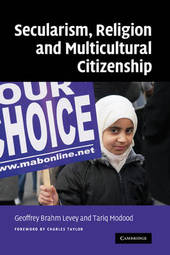
|
Secularism, Religion and Multicultural Citizenship
Hardback
Main Details
| Title |
Secularism, Religion and Multicultural Citizenship
|
| Authors and Contributors |
Edited by Geoffrey Brahm Levey
|
|
Edited by Tariq Modood
|
|
Foreword by Charles Taylor
|
| Physical Properties |
| Format:Hardback | | Pages:300 | | Dimensions(mm): Height 234,Width 157 |
|
| ISBN/Barcode |
9780521873604
|
| Classifications | Dewey:305.6 |
|---|
| Audience | | Professional & Vocational | |
|---|
| Illustrations |
6 Tables, unspecified; 1 Halftones, unspecified
|
|
Publishing Details |
| Publisher |
Cambridge University Press
|
| Imprint |
Cambridge University Press
|
| Publication Date |
20 November 2008 |
| Publication Country |
United Kingdom
|
Description
The Islamist attacks of 9/11, the Danish cartoon affair and rioting by Muslim youths in France are just some of the events that have caused the 'Muslim question' to become a key issue of public debate in many western democracies. Secularism, Religion and Multicultural Citizenship argues that the Muslim case raises important questions about how we understand western secularism and respond to new religious claims in multicultural democracies. The contributors challenge prevailing assumptions about the history and practice of western secularism and recover the pragmatism behind liberal principles in negotiating new conditions. By situating the Muslim experience in relation to western secularism and liberal democratic practice, and through examining a variety of national contexts (including Britain, Germany, France, Denmark, the United States, Australia and India), this book extends thinking about our contemporary condition and considers the broader significance for multicultural liberal democracies.
Author Biography
Geoffrey Brahm Levey is Senior Lecturer in the School of Social Sciences and International Studies and founding Director of the Program in Jewish Studies at the University of New South Wales, Sydney. Tariq Modood is Professor of Sociology, Politics and Public Policy and founding Director of the Centre for the Study of Ethnicity and Citizenship at the University of Bristol, UK.
ReviewsWhat, exactly, is liberal about passing restrictive policies designed to defend liberalism from the claims of religious populations? Nothing, is the answer given in this challenging and provocative book. In fact, many of the authors of these essays contend that European states have responded to the rise of Islam in their midst with a peculiar form of cultural and political sectarianism that has, at times, been glaringly illiberal. This book is sure to shape debate on a classic theoretical question that now resides at the heart of contemporary European politics. Tim Byrnes, Dept of Political Science, Colgate University
|